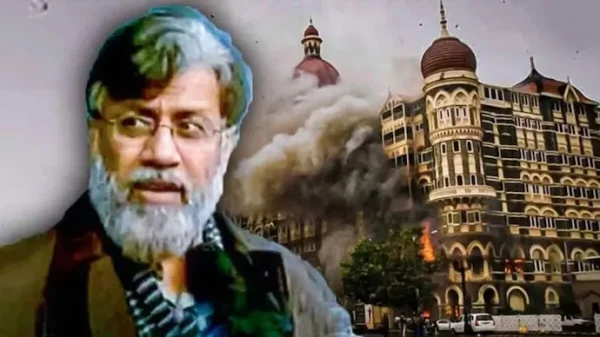In a significant step towards achieving justice for the victims of the 2008 Mumbai terror attacks, Tahawwur Hussain Rana, a Pakistani-Canadian with alleged ties to the attacks, has been extradited from the United States to India. The United States stated that this extradition is a move to secure “long sought justice for 166 people, including 6 Americans,” who tragically lost their lives in the attacks. India’s National Investigation Agency (NIA) took custody of Rana in New Delhi following his arrival.
The extradition process was marked by a highly sensitive and carefully planned operation. To minimize the risk of any disruptions or security breaches, Rana was transported to India on a Gulfstream G550 aircraft under a concealed flight code. The flight, which included a stopover in Romania, was closely guarded by National Security Guard (NSG) commandos and US Sky Marshals. Upon landing at Palam airport in Delhi, Rana was immediately taken into custody by the NIA.
Rana was subsequently presented before Special NIA Judge Chander Jit Singh in a closed-door hearing. At the request of Special Public Prosecutor Narender Mann, appointed by the Ministry of Home Affairs, the court granted the NIA an initial period of 18 days to conduct their interrogation. Advocate Piyush Sachdeva, provided by the Delhi Legal Services Authority, represented Rana during the proceedings.
Tahawwur Rana is accused of playing a key role in the planning and execution of the devastating 26/11 Mumbai attacks, which resulted in the deaths of nearly 170 people. He is believed to have worked closely with David Coleman Headley, his longtime associate and fellow conspirator, in orchestrating the terror plot. Investigations suggest that Rana used his position as an immigration consultant as a cover for his activities. During a visit to India in 2008, Rana traveled to several cities, including Agra, Hapur, and Kochi. Authorities suspect these trips were used to identify potential recruits for the Pakistan-based Lashkar-e-Taiba (LeT) terrorist organization.
Rana’s extradition followed a protracted legal battle in the United States. A district court in California initially ruled in favor of extradition in 2023. Rana challenged this decision, pursuing appeals all the way to the US Supreme Court. However, his appeals were consistently denied, paving the way for his transfer to India. The successful extradition was the result of close collaboration between US law enforcement and intelligence agencies, including the Department of Justice, the Federal Bureau of Investigation (FBI), and the US Marshals Service.
The NIA now intends to conduct a detailed interrogation of Rana. The agency aims to gather further information about the conspiracy behind the Mumbai attacks and to identify the involvement of other key figures based in Pakistan, such as Hafiz Saeed and Zakiur Rehman Lakhvi. The extradition of Rana is seen as a crucial step in India’s ongoing efforts to bring all those responsible for the 26/11 attacks to justice.

